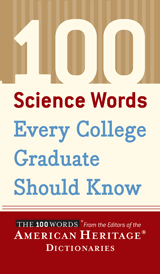
|
|
absolute zero agoraphobia alga algorithm allele alternating current amygdala anaphylaxis angiogenesis apoptosis archaeon artesian well ATP bandwidth Beringia big bang black hole Brownian motion Cambrian Explosion capacitor carbon sequestration centripetal force chemosynthesis cognitive dissonance complementarity cryptography cyanobacterium cyclone dendrochronology echolocation endorphin estivation eutrophication Fibonacci sequence |
fission fundamental force game theory genome gluon heliocentrism histone hominin hypha imaginary number interferon ischemia isomer junk DNA krill KT boundary Kuiper belt kwashiorkor logic gate magnetosphere megabyte melanoma mitochondrion monotreme monsoon Munchausen syndrome nanotube Neanderthal nosocomial infection obligate orbital pahoehoe Pavlovian phenotype |
pheromone photoelectric photon piezoelectric effect placebo prion prophylaxis protein folding protolanguage quantum mechanics radiometric dating rain shadow refraction REM sleep retrovirus roentgenium sex sociobiology solar wind superposition telomere teratogen theory tidal force time dilation Universal Time urea vestigial wave function xerophyte yolk zero |







